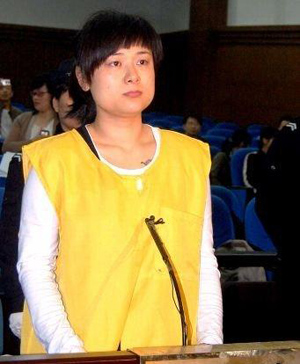Woman's death sentence rouses public debate
 0 Comment(s)
0 Comment(s) Print
Print E-mail
China Daily, January 20, 2012
E-mail
China Daily, January 20, 2012
The death sentence given to an ex-millionaire businesswoman found guilty of fraudulent fundraising has provoked widespread discussions on capital punishment for illegal fundraising, as well as on private lending.
 |
|
Wu Ying on trial. |
Wu Ying, 31, the former owner of Zhejiang-based Bense Holding Group, lost her appeal to the Zhejiang Provincial High People's Court on Wednesday, which upheld the verdict and death penalty of a local court in 2009.
The high court rejected Wu's appeal as she "brought huge losses to the nation and people with her serious crimes and should therefore be severely punished".
Wu was found to have illegally raised 770 million yuan ($122 million) by promising investors high returns between May 2005 and February 2007.
Of the money fraudulently pooled, 380 million yuan could not be returned and large amounts of other debts were unpaid, according to the court.
Wu said she was not guilty at the first trial but admitted in the second that she had "illegally pooled public deposits", a crime punishable by up to 10 years in prison.
However, the heaviest penalty for "fraudulent fundraising" is death, under the Criminal Law.
Zhang Yanfeng, Wu's defense lawyer, said that he and his colleagues were shocked when they heard the second verdict and that they will make every effort to plea for a lesser sentence while waiting for the necessary review by the Supreme People's Court in Beijing.
All death sentences in China require a final review by the top court before being carried out.
The crimes of "illegal pooling of public deposits" and "fraudulent fundraising" have similar definitions but divergent sentencing standards, said Wu Dong, a lawyer and partner of the M&A Law Firm in Shanghai.
On Thursday, many netizens were also calling for more lenient sentence for Wu. By 8:30 pm, about 64 percent of 398,885 respondents to an online survey at ifeng.com considered the death penalty too harsh for Wu and named the overabundance of hot money and lack of investment channels as the main reason she committed the crime.
China repealed the death penalty for 13 non-violent economic crimes in its 8th Amendment to the Criminal Law, which took effect on May 1. But capital punishment remained the most severe penalty for fraudulent fundraising.
Keeping the death penalty for fraudulent fundraising could be a sign of authorities' determination to crack down on illicit private lending, which can affect many people and have a huge social impact, Wu Dong said.






Go to Forum >>0 Comment(s)